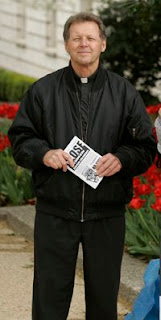It just may be the most famous — or infamous — parish in Missouri, known far beyond the borders of its own archdiocese. And this week, the local paper takes a look at life at St. Stanislaus Kostka — and puts a sharp focus on the man hired to lead it:
It was just before midnight on Christmas Eve 2005, and the Rev. Marek Bozek was the focus of 2,000 souls crammed in pews or standing on tiptoe in the aisles, straining to see him.
They came to St. Stanislaus Kostka church to be a part of Bozek’s first Mass as pastor. He had arrived in St. Louis from Springfield, Mo., thumbing his nose at the Roman Catholic hierarchy and riding to the rescue of fellow Polish countrymen deprived of the Eucharist for more than a year by their archbishop.
For many St. Stanislaus parishioners whose ancestors had built the church just north of downtown, Bozek became a hero.
But more than two years later, Bozek has reshaped the church into a community that would be unrecognizable to those 19th-century founders.
His vision for a reformed Roman Catholic faith calls for supporting female ordination, allowing priests to get married and accepting gay relationships. Bozek’s stands have attracted hundreds of new St. Stanislaus parishioners who share the priest’s reform-minded vision.
But they have also divided the church, pitting newer members against traditional parishioners unhappy with how far the priest has gone in condemning the Roman Catholic church.
There have also been questions about the priest’s trappings. He has negotiated a 143 percent salary hike, moved into a $157,000 Washington Avenue loft and leased a 2008 BMW for $450 per month.
Some parishioners point to another sign that alarmed them: Bozek, while in Poland last year, bought a silver ring custom-made for a bishop there. When he returned, he showed the ring to his parish at a Sunday Mass and spoke about it from the pulpit.
Because it’s a bishop’s ring and he is only a priest, Bozek says, he has not worn it. But he won’t say he never will — he does not rule out the possibility of becoming the leader of what he calls an “underground Roman Catholic” movement.
The three parish leaders who recruited Bozek say they now regret it.
To find out why, read the rest.

